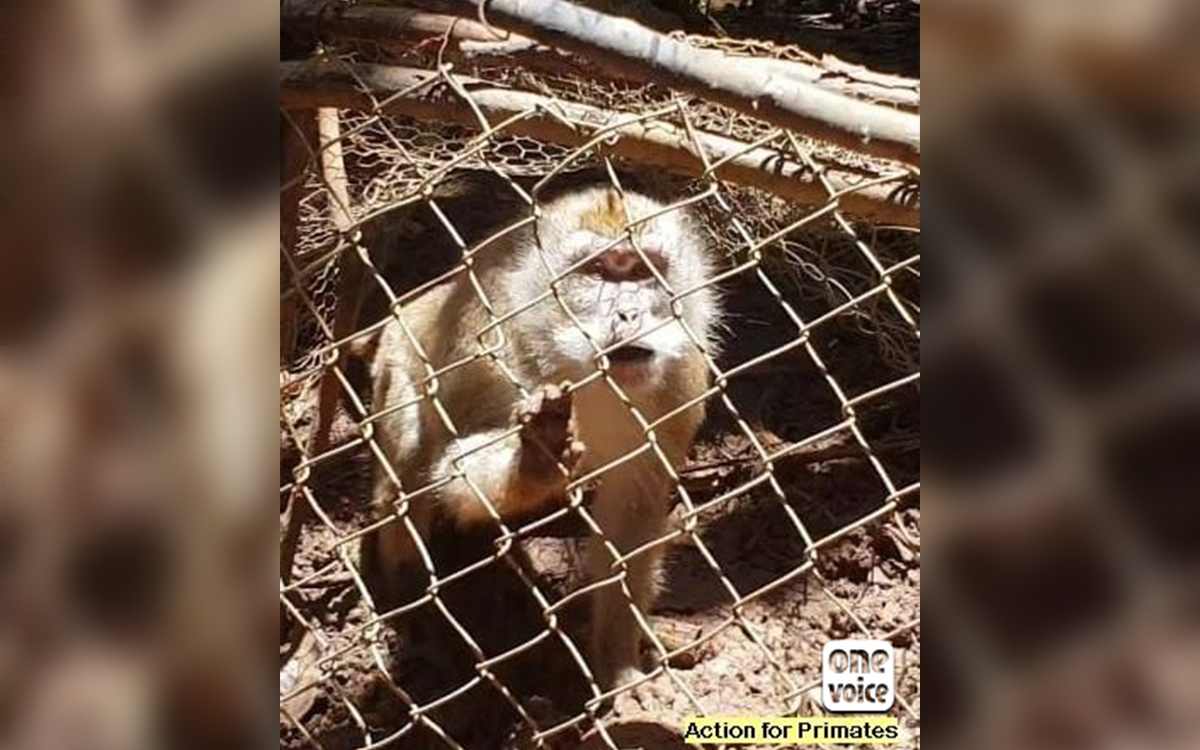

The constant persecution of monkeys in Mauritius
Action for Primates and One Voice have been alerted to the trapping of long-tailed macaques taking place in Mauritius. Deep in the forest near Tamarind Falls, one of them was discovered in great distress by a walker. It was caught in a trap. Worried about its fate, the walker filmed it before helping. This macaque has therefore been released, free to return to its family and social group. An exception.
A tragedy
Others do not get this chance. In Mauritius, wild monkeys are not protected. They are trapped for many reasons, mostly either to be eaten, kept as ‘companion animals’, exported directly to laboratories or, after having been used for breeding, their babies are taken by companies exporting monkeys, or lastly, simply killed because they are considered pests.
Many people are unaware that in Mauritius, monkeys can be captured to be sold as ‘companion animals’ or to be served as food. Bushmeat — such as the flesh of long-tailed macaques that have been captured and slaughtered — can indeed be found for sale on the island.
Trapping: a dreadful and barbaric process
In 2021, Biosphere Trading, one of the companies exporting monkeys, obtained authorisation from the government to increase their facilities and to capture up to 1000 monkeys for reproduction. According to a report at the time, Biosphere intended to provide landowners and operators with traps to capture monkeys and then offer to buy selected individuals. The business did not indicate what was in store for the remaining individuals, for the ‘undesirables’…
Biosphere Trading actually placed a premium on monkeys’ heads. These macaques had been torn from their families and natural habitat to be exported to laboratories or imprisoned for years in concrete enclosures for breeding purposes; the infants were continually torn from their mothers to then be exported to laboratories.
Biosphere Trading, a company at the centre of capturing for animal experimentation in the Western world
We know that the majority of long-tailed macaques are used in testing to estimate the toxicity of medications and chemical products. In these ‘poisoning’ tests, the monkeys are given a substance by injection or by force-feeding to see the harmful effects of the materials. In 2021, there was a strong increase (14,640) in the number of long-tailed macaques exported from Mauritius for research and toxicity testing; this figure represents a growth of more than 35% of those sent abroad in 2020 (10,827). Last year, Members of the European Parliament also put our questions to the European Commission for these macaques.
Treating sentient and intelligent beings in this way is abhorrent. The trapping of wild monkeys is a universally condemned practice due to the cruelty and suffering caused by it and the removal of individuals from their natural habitat and their family and social groups.
You too can do something to change this!
Join Action for Primates and One Voice in defending monkeys in Mauritius. We must put an end to the cruel and horrendous treatment of wild long-tailed macaques.
Send an email to the following people to demand that they put a stop to the trapping of wild monkeys and introduce a law to protect them (you can find an example email here):
- The Animal Welfare Unit managed by the Ministry of Agro Industry: animalwelfaredev@govmu.org.
- Pravind Kumar Jugnauth, Mauritian Prime Minister: privateoffice@govmu.org
- Write to the Mauritian Ambassador in your country: https://www.embassy-worldwide….
If you live in Mauritius and you are aware of wild captive monkeys that are being eaten or used as ‘companion animals’, contact us at: info@actionforprimates.org and info@one-voice.fr
Translated from the French by Joely Justice